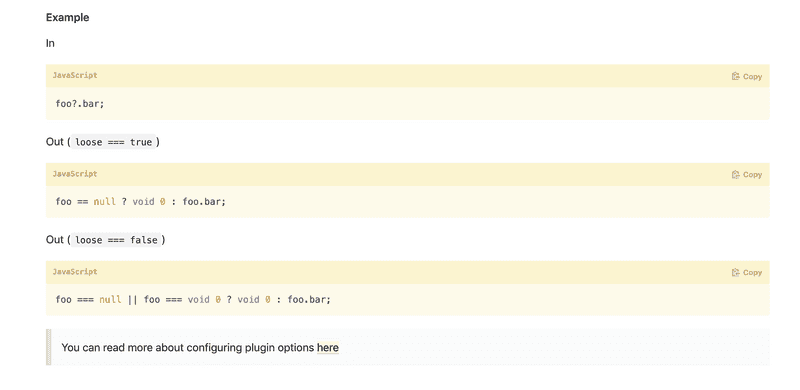A few days ago, an announcement that many expected was published in TC39 Stage 3. Optional Chaining
Example here with
🎉🎉🎉🎉BREAKING: #TC39: Optional Chaining has now moved to Stage 3!!! #JavaScript pic.twitter.com/mUjJRXiOZx
— Sean Thomas Larkin 廖肖恩 (@TheLarkInn) July 25, 2019
It is a great news for Javascript ! This feature is awesome but…
Please agree with me, this feature will not be available tomorrow in our browsers. In stage 3, it is very likely that this feature will be added in the next release of ES.
But
We will need to babel it for a very long time.
If you take a look at @babel/plugin-proposal-optional-chaining, this is how babel will transpile it.

This is kind of a very verbose output.
Let’s imagine that we use this feature very many times in a web application, and you use it for deep case.
const foo = everything?.could?.be.nullable?.maybe
// Babel will generate this output
var _everything, _everything$could, _everything$could$be$
var foo =
(_everything = everything) === null || _everything === void 0
? void 0
: (_everything$could = _everything.could) === null ||
_everything$could === void 0
? void 0
: (_everything$could$be$ = _everything$could.be.nullable) === null ||
_everything$could$be$ === void 0
? void 0
: _everything$could$be$.maybe
// Terser would modify like this
l, n, o
null === (l = everything) ||
void 0 === l ||
null === (n = l.could) ||
void 0 === n ||
null === (o = n.be.nullable) ||
void 0 === o ||
o.maybeIt’s going to be really verbose in your bundles. The transformation made by babel in the state does not at all share the nullsafe access mechanism as lodash.get can do. Even if lodash is very/too heavy. It offers a more efficient nullsafe implementation while generating less code.
You’re going to tell me,
“What the heck! Antoine, it’s not the first time we’ve used a not-so-great polyfill to be able to use a new feature of EcmaScript”
Yeah
Ok but this time we can still look a few minutes to propose an implementation of a less trivial polyfill. This solution cannot really be applied in a world where the web developer turns into a Ko hunter.
Let’s look at how lodash.get works. Github link
import castPath from './castPath.js'
import toKey from './toKey.js'
/**
* The base implementation of `get` without support for default values.
*
* @private
* @param {Object} object The object to query.
* @param {Array|string} path The path of the property to get.
* @returns {*} Returns the resolved value.
*/
function baseGet(object, path) {
path = castPath(path, object)
let index = 0
const length = path.length
while (object != null && index < length) {
object = object[toKey(path[index++])]
}
return index && index == length ? object : undefined
}
export default baseGetIt’s very effective (very compact). What if the polyfill of the Optional Chaining involved the application of a utility function like lodash.get?
What’s your opinion on that?
Feel free to share and react if you liked this article.